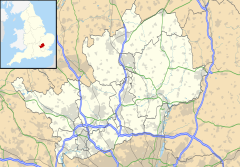
Back ليتشوورث Arabic ليتشوورث ARZ لتچوورث قاردن سیتی AZB Letchworth Garden City (lungsod) CEB Letchworth Welsh Letchworth Garden City German Letchworth Esperanto Letchworth Garden City Spanish لتچوورث گاردن سیتی Persian Letchworth Finnish
| Letchworth Garden City | |
|---|---|
 | |
Location within Hertfordshire | |
| Population | 33,990 (Built up area, 2021)[1] |
| OS grid reference | TL215325 |
| District | |
| Shire county | |
| Region | |
| Country | England |
| Sovereign state | United Kingdom |
| Post town | Letchworth Garden City |
| Postcode district | SG6 |
| Dialling code | 01462 |
| Police | Hertfordshire |
| Fire | Hertfordshire |
| Ambulance | East of England |
| UK Parliament | |
Letchworth Garden City, commonly known as Letchworth, is a town in the North Hertfordshire district of Hertfordshire, England. It is noted for being the first garden city. The population at the time of the 2021 census was 33,990.
Letchworth was an ancient parish, appearing in the Domesday Book of 1086. It remained a small rural village until the start of the twentieth century. The development of the modern town began in 1903, when much of the land in Letchworth and the neighbouring parishes of Willian and Norton was purchased by a company called First Garden City Limited, founded by Ebenezer Howard and his supporters with the aim of building the first "garden city", following the principles Howard had set out in his 1898 book, To-morrow: A Peaceful Path to Real Reform. Their aim was to create a new type of settlement which provided jobs, services, and good housing for residents, whilst retaining the environmental quality of the countryside, in contrast to most industrial cities of the time.
The town's initial layout was designed by Raymond Unwin and Barry Parker. It includes the United Kingdom's first roundabout, Sollershott Circus, which was built c. 1909. The layout for Letchworth incorporates extensive parkland and open spaces, including Norton Common and Howard Park.
A takeover of First Garden City Limited in 1960 led to significant changes in how the company managed the town, which were opposed by the residents and local council who wanted the original garden city ideals retained. They secured an act of parliament which transferred ownership of the estate from the company to a public sector body, the Letchworth Garden City Corporation, in 1963. The corporation in turn was replaced by a charitable body in 1995, the Letchworth Garden City Heritage Foundation, which owns and manages the estate today.
Letchworth today retains large business areas providing jobs in a variety of sectors, and the landlord's profits are reinvested for the benefit of the community by the Heritage Foundation. The town lies 32 miles (51 km) north of London, on the railway linking London to Cambridge, and it also adjoins the A1 road, making it relatively popular with commuters. Residential areas in the town are mixed; large parts of the town are included in conservation areas in recognition of their quality, but the town also contains four of the five poorest-scoring neighbourhoods in North Hertfordshire for deprivation.
As the world's first garden city, Letchworth has had a notable impact on town planning and the new towns movement; it influenced nearby Welwyn Garden City, which used a similar approach, and aspects of the principles demonstrated at Letchworth have been incorporated into other projects around the world including the Australian capital Canberra, Hellerau in Germany, Tapiola in Finland and Mežaparks in Latvia.
- ^ "Towns and cities, characteristics of built-up areas, England and Wales: Census 2021". Census 2021. Office for National Statistics. Retrieved 8 August 2023.
